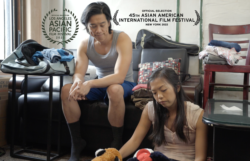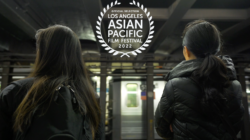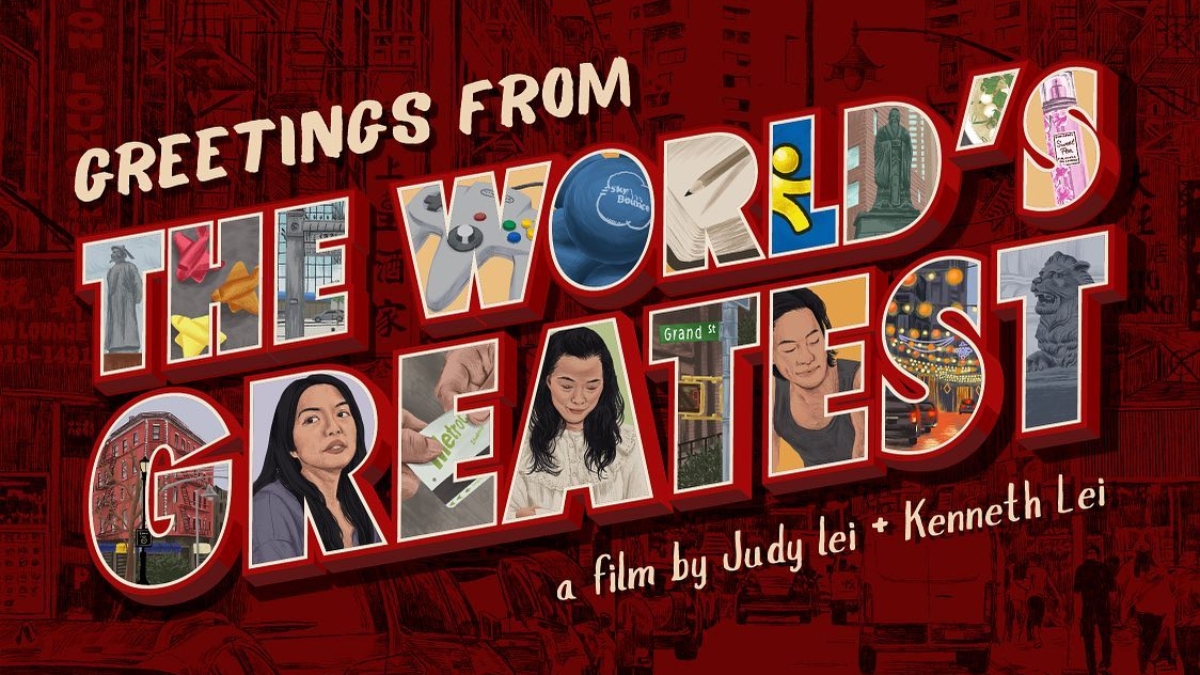In her first feature film, Judy Lei offers a cathartic reflection on life in Chinatown and her journey to finding herself
Written By: Eve Golecruz
It’s a film about firsts: the first time our protagonist Judy gets drunk, her first time having sex, her first subway ride to adulthood, and now, director Judy Lei’s directorial debut. “The World’s Greatest” is a semi-autobiographical film that showcases Judy Lei’s young, almost-high-school-graduate self in Chinatown, New York, navigating her life at a time of critical decision-making and peak socializing. Adding to the pressures of making new friends and living like the rambunctious teenager she never was, Judy struggles with her naggingly loving mom and the drama of her dad’s second family.
Black-and-white footage of Chinatown starts off the film. Playing as herself, Judy Lei’s voice sets the stage for her life in the “Don’t fuck with me” city. Voiceover narration of the immigrant child vs. immigrant parent narrative juxtaposes hopeful images of Chinatown throughout the seasons, capturing the liveliness and pride that the city represents while setting the stage for the drama about to occur.
Quickly, we come to understand the landscape of Judy’s life. She and her mother (Vanessa Kai) live in a small apartment in Chinatown. School, grades, and college plans are at the top of the list for discussions in the apartment. For her mom, there’s no excuse to fail despite the overwhelming commitments garnered in Judy’s senior year in high school – just “manage it,” she says. But Judy learns Chinese better from television than going to some language school to get a seemingly irrelevant paper diploma (think smarter, not harder).
Outside of the apartment drama, we meet Judy’s older brother, Ken (Leonard Wu), a college student who often visits home. We don’t learn much about her father (voiced by Vincent Tang), the critical information being that he’s been absent in the past few years (sparing some phone calls) and that he has a second family in China.

Ken (Leonard Wu) and Judy in one of the final scenes in the film.
As Judy deals with the typical pressures of high school – navigating awkward interactions with peers, cheating on tests, applying for colleges – she seeks to forge her own path and find a space for herself beyond the one expected from her quiet, introverted demeanor. She meets Jessie (Cindy Chu), a self-assured 18-going-on-25-year-old Bay girl archetype, and her unethically non-monogamous kind-of-boyfriend, Jake (Curtis Lum). After being pulled into the orbit of Jessie, Jake, and the rest of their Chinatown friends, Judy begins to build an identity farther from the one her mother expected of her.
She changes her look, following Jessie’s advice: “There’s no such thing as an ugly woman. Just lazy ones.” She goes out to the club past her curfew and gets back home two hours late – joining her mother and brother for a cold dinner.
Judy Lei the filmmaker explores themes of family, independence, and trauma wrapped in Asianness. She represents the traumas often unspoken in mainstream media. Things like the anti-climatic disappointment of your first sexual experience; parents’ silent judgements disguised as constructive criticism and earnest worry; and the convoluted definition of sacrifice – whether it means leaving everything you know for a better life for your kids, or giving your kids the right amount of freedom to make their own decisions, even if it goes against your every expectation (perfectly captured by the cold dinner scene).

Mom (Vanessa Kai) and Judy at Grand Street Station.
We’re taken through a whirlwind of events and hidden meanings in “The World’s Greatest” but it’s what perfectly captures the raw reflection of our lives – we are multitasking what life throws at us and, in Judy’s mom’s words, we simply “learn how to manage it.”
In my interview with Judy Lei, here’s what she had to say about the film:
Who was this film written for?
Originally, I wanted to write it for Chinatown kids like myself because all of the stuff I’ve seen so far of the Asian American experience is like, “Oh, everyone lives such a glamorous lifestyle,” or it’s set in the suburbs somewhere where they’re trying to assimilate to a white community. In New York, it’s not like that. We all grow up with people of color and you can barely see a single white person in at least the schools I went to.
I changed the script completely during COVID-19. And so I asked myself, “If I could write a letter to myself when I was younger, what would I write?”
This film is a way to resolve all the issues that happened in the past. While working on it, while editing it, it’s a comfort to know that there’s a space in the world for a more quiet person.
There were several scenes where Judy’s mom is making food and Judy would be helping. What did those moments mean for you as a filmmaker?
It actually means a lot. Because my dad was away, my mom would always work and the only time I would see her was at night when she was cooking or when we were eating together. And this still rings true now because she’s my roommate.
When I was in high school, the only time we got to connect was when she was cooking, like when she’s holding a cleaver. And I don’t know what it is about Chinese parents or Chinese immigrant parents and their way of communicating, it’s like we try to always have a conversation with them but it always takes a hot turn… There was a lot of pain in that, and I confronted her maybe like three weeks ago about moving out because I’m old now. And she got scared, she’s like: “Oh, me nagging you was not really me trying to control you, I just really need to see when you’re coming home, or when I should cook dinner.” So that’s really her expressing love.
What was your favorite moment in this whole process?
I’ve gone through so much pain with this film that it’s hard to pinpoint a moment. But I think what this project helped me discover is meeting other fellow creatives, or just actors in general who really gave it their all. We didn’t have any resources, but then they came in and rolled up their sleeves. Everything you saw on film, it was just the first or second take, and so everyone brought their juice.
What is the key takeaway you want people to get from this film?
If you can, it’s very important to leave your safety net and take the plunge and go elsewhere to really find yourself, or leave home, so to speak.
I honestly didn’t want to go away from home, but my high school teacher was like, “Oh yeah, if you don’t go away I’ll never talk to you again,” and I didn’t realize what her intentions behind that statement were until I left. That blue duffle bag you saw in the movie, she was the advisor for the National Honor Society, and she gave it to me because she was like, “I hope this duffle bag will change your decision.” And it did.
Whatever dream you have in life, I think it’s important to just chase after it and don’t let anyone tell you otherwise. This project, a lot of people told me, “No. You’re crazy for this, I don’t want to sign on to this project, this is so low budget,” blah blah blah. I heard a bunch of “No”’s and I’m still hearing “No”’s, but that shit’s not gonna stop, and that’s just life. You need to push past the “No”’s and just keep saying “Yes” to yourself.
This interview has been lightly edited for clarity.
“The World’s Greatest” screened at the 45th Asian American International Film Festival.

